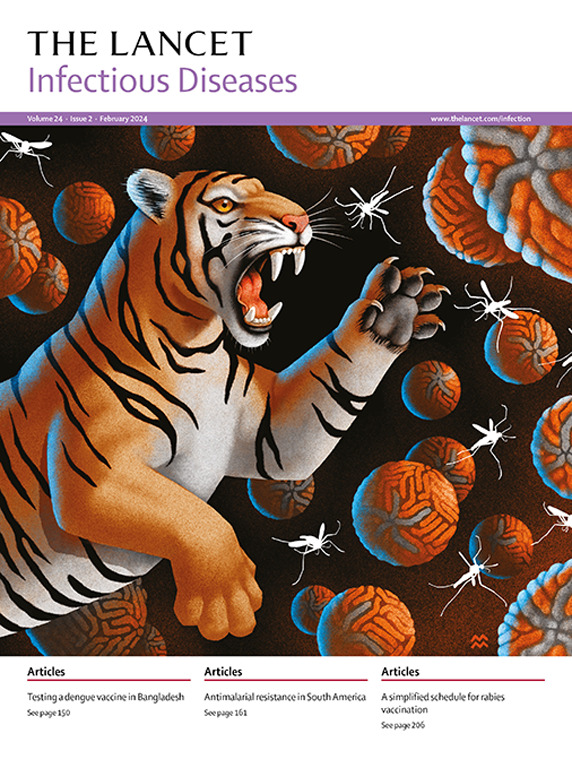Efficacy and safety of sipavibart for prevention of COVID-19 in individuals who are immunocompromised (SUPERNOVA): a randomised, controlled, double-blind, phase 3 trial
IF 36.4
1区 医学
Q1 INFECTIOUS DISEASES
引用次数: 0
Abstract
Background
Sipavibart is an anti-spike monoclonal antibody that neutralises SARS-CoV-2 with exceptions, including Phe456Leu-containing variants (eg, KP.2* and KP.3*). This trial assessed sipavibart efficacy and safety for prevention of symptomatic COVID-19 in participants who are immunocompromised.Methods
In this ongoing, double-blind, international, phase 3 trial, we enrolled participants who were immunocompromised and aged 12 years or older at 197 hospitals, university health centres, and clinical trial units in 18 countries. Participants were randomly allocated 1:1 to a sipavibart group (intramuscular sipavibart 300 mg on days 1 and 181) or a comparator group (tixagevimab 300 mg–cilgavimab 300 mg on day 1 and placebo on day 181 or placebo on days 1 and 181), stratified by previous COVID-19 vaccination and infection status and use of tixagevimab–cilgavimab. The primary efficacy outcomes were symptomatic COVID-19 caused by any variant or symptomatic COVID-19 caused by non-Phe456Leu-containing variants within 181 days of dosing, assessed in the SARS-CoV-2-negative set, comprising all participants without a positive RT-PCR test for SARS-CoV-2 at baseline and who received at least one trial intervention dose. Safety outcomes for adverse events were assessed 90 days following the first dose and for serious adverse events throughout the study in the safety analysis set (ie, all participants who received at least one injection of sipavibart or comparator). This study is registered with ClinicalTrials.gov, NCT05648110.Findings
Participants were screened from March 31 to Oct 27, 2023; 3349 participants (56·8% female) were randomly assigned: 1674 to the sipavibart group (five no first dose; 1669 sipavibart) and 1675 to the comparator group (nine no first dose; 1105 tixagevimab–cilgavimab and 561 placebo). Within 181 days of dosing, 122 (7·4%) of 1649 participants in the sipavibart group and 178 (10·9%) of 1631 participants in the comparator group had symptomatic COVID-19 due to any variant (relative risk reduction [RRR] 34·9% [97·5% CI 15·0 to 50·1]; p=0·0006), 54 (3·3%) participants in the sipavibart group and 90 (5·5%) participants in the comparator group had symptomatic COVID-19 due to non-Phe456Leu-containing variants (RRR 42·9% [95% CI 19·9 to 59·3]; p=0·0012), and 47 (2·9%) participants in the sipavibart group and 64 (3·9%) participants in the comparator group had symptomatic COVID-19 due to Phe456Leu-containing variants (30·4% [–1·8 to 52·5]). Adverse events occurred in 833 (49·9%) of 1671 participants in the sipavibart group and 857 (51·5%) of 1663 participants in the comparator group within 3 months of the first dose. One COVID-19-related death occurred in the comparator group. Serious adverse events considered related to trial intervention occurred in two (0·1%) of 1671 participants in the sipavibart group and seven (0·4%) of 1663 participants in the comparator group (none fatal). No serious cardiovascular or thrombotic events were considered to be related to sipavibart.Interpretation
The primary analysis showed efficacy and safety of sipavibart in preventing symptomatic COVID-19 in participants who are immunocompromised when susceptible (ie, non-Phe456Leu-containing) variants dominated, although no efficacy was shown against resistant (ie, Phe456Leu-containing) variants that dominate as of November, 2024.Funding
AstraZeneca.sipavibart在免疫功能低下(SUPERNOVA)患者中预防COVID-19的有效性和安全性:一项随机、对照、双盲、3期试验
sipavibart是一种抗刺突单克隆抗体,可中和SARS-CoV-2,但也有例外,包括含有phe456leu的变体(如KP.2*和KP.3*)。该试验评估了西帕巴特在免疫功能低下的参与者中预防症状性COVID-19的有效性和安全性。在这项正在进行的双盲国际三期试验中,我们在18个国家的197家医院、大学卫生中心和临床试验单位招募了免疫功能低下且年龄在12岁或以上的参与者。根据之前的COVID-19疫苗接种、感染状况和使用情况,参与者按1:1随机分配到西帕维巴特组(第1天和181天肌肉注射西帕维巴特300毫克)或对照组(第1天和181天使用替沙韦玛-西gavimab 300毫克,安慰剂或安慰剂)。主要疗效结果是在给药后181天内由任何变体引起的症状性COVID-19或由不含phe456leu的变体引起的症状性COVID-19,在SARS-CoV-2阴性组中进行评估,包括基线时没有SARS-CoV-2 RT-PCR检测阳性且接受至少一次试验干预剂量的所有参与者。不良事件的安全性结果在首次给药后90天进行评估,并在安全性分析集中评估整个研究期间的严重不良事件(即,所有接受至少一次sipavibart或比较物注射的参与者)。本研究已在ClinicalTrials.gov注册,编号NCT05648110。研究结果:参与者于2023年3月31日至10月27日进行筛选;3349名参与者(56.8%为女性)被随机分配:1674名参与者被分配到西帕韦巴特组(5名没有第一次剂量;1669例sipavibart)和1675例(9例无首次剂量;1105例替沙吉维单抗-西gavimab, 561例安慰剂)。在给药后181天内,西帕维巴特组1649名参与者中有122名(7.4%)和比较组1631名参与者中有178名(10.9%)由于任何变异而出现症状性COVID-19(相对风险降低[RRR] 34.9% [97.5% CI 15.0至50.1];p= 0.0006),西帕维巴特组54例(3.3%)和比较组90例(5.5%)由于不含phe456leu变异而出现症状性COVID-19 (RRR为42.5% [95% CI为19.9 ~ 59.3];p= 0.0012),西帕维巴特组47例(2.9%)和比较组64例(3.9%)由于含有phe456leu的变异而出现症状性COVID-19(30.4%[-1·8 ~ 52.5])。西帕维巴特组1671名受试者中有833名(49.9%)在第一次给药后3个月内发生不良事件,对照组1663名受试者中有857名(51.5%)发生不良事件。比较组发生1例与covid -19相关的死亡。被认为与试验干预相关的严重不良事件在sipavibart组的1671名参与者中有2名(0.1%)发生,在比较组的1663名参与者中有7名(0.4%)发生(无致命)。没有严重的心血管或血栓事件被认为与西帕韦巴特有关。初步分析显示,当易感(即不含phe456leu)变异占主导地位时,西帕巴特在预防免疫功能低下参与者的症状性COVID-19方面的有效性和安全性,尽管截至2024年11月,对耐药(即含phe456leu)变异占主导地位没有显示出有效性。
本文章由计算机程序翻译,如有差异,请以英文原文为准。
求助全文
约1分钟内获得全文
求助全文
来源期刊

Lancet Infectious Diseases
医学-传染病学
CiteScore
60.90
自引率
0.70%
发文量
1064
审稿时长
6-12 weeks
期刊介绍:
The Lancet Infectious Diseases was launched in August, 2001, and is a lively monthly journal of original research, review, opinion, and news covering international issues relevant to clinical infectious diseases specialists worldwide.The infectious diseases journal aims to be a world-leading publication, featuring original research that advocates change or sheds light on clinical practices related to infectious diseases. The journal prioritizes articles with the potential to impact clinical practice or influence perspectives. Content covers a wide range of topics, including anti-infective therapy and immunization, bacterial, viral, fungal, and parasitic infections, emerging infectious diseases, HIV/AIDS, malaria, tuberculosis, mycobacterial infections, infection control, infectious diseases epidemiology, neglected tropical diseases, and travel medicine. Informative reviews on any subject linked to infectious diseases and human health are also welcomed.
 求助内容:
求助内容: 应助结果提醒方式:
应助结果提醒方式:


